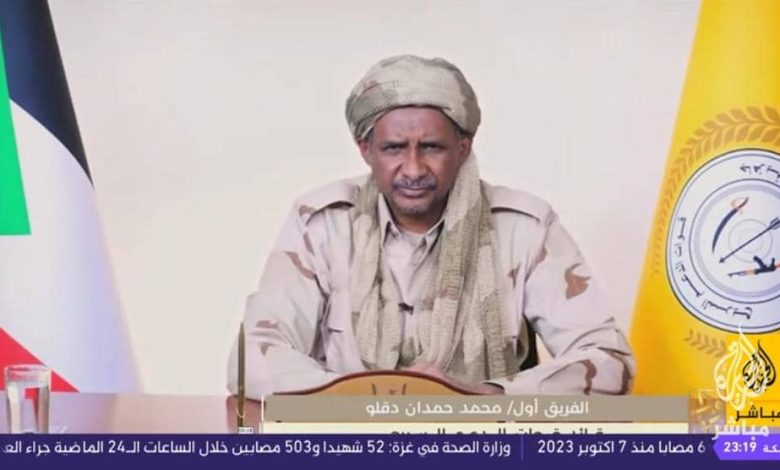Hemedti Again Accuses Egypt of Supporting the Sudanese Army

The commander of the Rapid Support Forces (RSF) in Sudan, Mohamed Hamdan Dagalo (Hemedti), renewed on Monday his accusation that Egypt is supporting the Sudanese army and supplying it with aircraft piloted by Egyptian pilots to bomb areas under his forces’ control.
In a video statement, Hemedti claimed that Cairo had provided Khartoum with eight aircraft flown by Egyptian pilots, saying they take off from the city of Dongola to bomb Darfur and Kordofan. He described this as a “blatant aggression against the Sudanese people.”
He also accused Egypt of sending 32 military trucks on Sunday, loaded with ammunition, weapons, and fuel used by the aircraft.
The RSF commander said the Sudanese army is also receiving drones from other sources, which he claimed to know but refrained from naming.
According to Hemedti, the war will end “soon.” He also announced his refusal to return to the Jeddah talks, stating, “The era of bargaining is over. There is no peace with those who bomb their people and deny their crimes.”
He added, “We are ready for a political solution, but not with murderers and criminals.”
On-the-Ground Developments
On the military front, Hemedti warned the Sudanese army, saying, “If you think of using El-Obeid as a launch point to bomb Darfur and Kordofan, we will come for you.”
He urged residents of El-Obeid to stay in their homes, close their shops, and avoid going near military sites.
Previously, Hemedti had accused Egypt of participating in airstrikes against his forces in Jabal Moya in Sennar State, central Sudan. He also accused Cairo of training the Sudanese army and providing it with drones.
Egypt denied those accusations, with the Egyptian Foreign Ministry issuing a statement on social media saying the Egyptian military is not participating in the conflict in Sudan. It called on the international community to examine the evidence behind Hemedti’s claims.
The statement affirmed Egypt’s commitment to the security, stability, and unity of Sudan—its land and people—and stressed that Egypt would spare no effort in providing all possible support to Sudan in facing the severe consequences of the ongoing war.
The war between the Sudanese army, led by Sovereign Council Chairman Abdel Fattah al-Burhan, and Hemedti has continued since it broke out in mid-April 2023, leaving over 20,000 dead and nearly 15 million displaced or refugees, according to the United Nations.
Humanitarian Crisis
Meanwhile, Doctors Without Borders (Médecins Sans Frontières – MSF) reported that Sudanese refugees fleeing escalating attacks in Darfur to eastern Chad are facing “harsh conditions” and struggling to access basic services.
According to the organization, since late April, an estimated 40,000 Sudanese refugees have arrived at the “Ten Transit Camp,” most of them coming from El-Fasher and nearby displacement camps.
Ten Camp serves as a transit point for nearby refugee camps in eastern Chad, near the Sudanese border, where MSF is expanding assistance for the new arrivals.
MSF stated that some of the newly arrived refugees are suffering from malnutrition and deep psychological trauma caused by horrific violence in North Darfur and along the routes to Chad.
The organization noted that the vast majority of refugees are women and children from El-Fasher and the Zamzam IDP camp, who had already endured famine conditions after RSF forces imposed a blockade on the area. According to the Famine Review Committee, famine had persisted in Zamzam for months.
Currently, the Ten Transit Camp hosts over 18,000 people, many of whom are sleeping directly on the ground in 40-degree heat without shelter and with very limited access to water and food.
MSF is conducting over 900 consultations per week at the camp’s health center. The global acute malnutrition rate among children under five has reached 29%, with 9% suffering from severe acute malnutrition.
The organization confirmed it is preparing for further distribution of therapeutic food and essential supplies, noting that it is currently providing 60 liters of water per day—only half of the minimum daily requirement.
Source: Al Jazeera + Agencies + Sudanese Press



